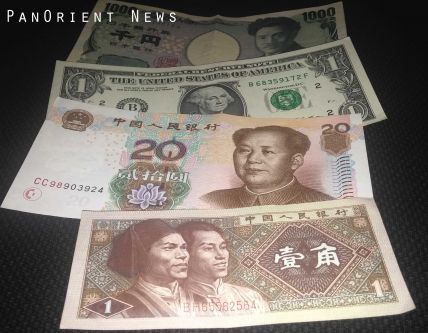|
|
Ecnomy-Finance
Media Hysteria Trumps Fact on China's Yuan Move
Thursday, August 20, 2015

By Anthony Rowley
Special to PanOrient News
Tokyo- Those crafty Chinese are at it again, to hear most Western analysts and media tell it. They are "manipulating" the value of their currency (the yuan) in order to boost exports and squeeze what little growth there is left in world trade to their own advantage.
China's central bank (The People's Bank of China, PBOC) took financial markets off guard on August 11 when it announced it was devaluing the yuan (renminbi) by just under 1.9 per cent against the dollar. This was followed next day by a further 1.6 per cent making a total devaluation of some 3.5 per cent.
If the PBOC's move was mildly surprising the reaction of financial markets and media was astonishing. This “drastic” move by the PBOC was a sure sign that China's economy was “drifting onto the rocks”, reports in Western media declared. As a desperate measure, they said, China is trying to manipulate the value of the yuan downwards in order to boost exports. In so doing, Beijing has declared "currency was" and other emerging economies will suffer as a result, media warned.
Veteran investment banker, former Goldman Sachs Asia vice president Kenneth Courtis was so outraged at the allegations that he accused some analysts and journalists of being plain "racist." "I am surprised by the hyperbole and wild exaggeration regarding developments in China presented in much of the international media,." said Courtis who now heads investment group Startfort Holdings in Asia. "Is it racism or a hope to see China fail, or is it something else? Whatever it is, it is not analysis based on fact."
When viewing actions by China, added Courtis, a "stock market correction is presented as being a "massive crash," and government efforts to quell stock market panic are said to be "manipulation of the market”. Likewise, a 3 per cent move of the yuan back toward fair value is expected to trigger “global currency wars."
These allegations about the supposedly evil Chinese plotting currency wars are grimly amusing. First the US Federal Reserve, then the Bank of England, followed by the Bank of Japan and now the European Central Bank, all three have launched massive monetary stimulus known as quantitative easing or QE. Naturally, when you increase the supply of a commodity the price drops, unless demand surges at the same time. With trillions of dollars, pounds, yen and euro injected into the global economy at a time when demand is weak, the value of these currencies has slumped. If this type of action is not a prelude to currency wars, then what is?
What is even more hypocritcal - laughable even - is the idea that China's devluation of the yuan is a "drastic" move. The Japanese yen has crashed by a massive 35 per cent since the Bank of Japan embarked upon QE a couple of year ago while the euro has also dropped, as did the US dollar and the British pound earlier on.
So, what is really going on in China's case? Beijing is eager for the yuan to join the select band of four leading currencies, the dollar, euro, yen and pound that make up what is known as the IMF"s "fiat" currency - Special Drawing Rights (SDRs).
The SDR is not a currency in the sense that ordinary people can use it to buy goods and services or deposit it in their bank. It is a kind of quasi money or currency basket in which nations can store their foreign reserves. One day, it could become "real" money in the sense of being the prime international reserve currency or even a means of settling global financial transactions. As the second largest economy in the world, China's desire to be part of the SDR is understandable.
But first Beijing needs to prove that it does not manipulate the yuan's value by demonstrating that the currency is free to move in line with market forces. Ironically, that is precisely what the August 11 was designed to achieve. After the IMF publically welcomed the PBOC's initiative, markets calmed down and disgruntled commentators retreated to the sidelines, while still muttering dark prophecies about the imminent downfall of the Chinese economy.
Far from being manipulated downwards, the yuan has strengthened greatly in recent years and if the analysts and media who were so eager to attack China's move had done a bit of homework, they would know that. When China's economy began opening up after 1978, the yuan or renminbi was only used domestically; foreigners used exchange certificates, which led to the development of a major black market. Then, from 1997 to 2005, Chinese authorities pegged the yuan to the dollar at approximately 8.3 to 1.
And over the past ten years it has appreciated sharply to 6.4 to the dollar, making Chinese exports less - rather than more - competitive internationally. What's more, the IMF itself issued a report several months ago suggesting that the yuan was "moderately" overvalued at that time. The August 11 move simply corrected that overvaluation.
It is "unlikely to mark the start of competitive currency devaluations in Asia", according to another veteran financial analyst, Jesper Koll. Former chief strategist at JPMorgan Bank in Tokyo and now CEO of asset management group, WisdomTree in Japan, Koll, like Courtis, seems anxious to set the record straight. But for much of the media it seems to be a case of not letting facts ruin a good story.
Anthony Rowley is a long-standing expert on East Asian economic and financial affairs, resident in Tokyo
PanOrient News
© PanOrient News All Rights Reserved.
|
|